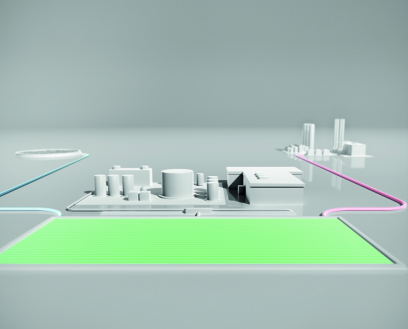Audi e-diesel and e-ethanol
Audi is promoting the development of new CO2-neutral fuels.** The underlying technology is completely new: Microorganisms utilize solar energy to produce synthetic ethanol and synthetic diesel from carbon dioxide and water.
The problem has been familiar for a long time, but it has yet to be solved: The combustion of conventional petroleum fuels pollutes the atmosphere by releasing carbon dioxide into it. Ethanol and diesel made from renewable raw materials such as maize and rapeseed generally achieve a better environmental balance, because the plants have already previously absorbed the CO2 that is released when they are combusted.** But such fuels are costly and compete with food agriculture – so they do not represent a long-term solution in a world whose population continues to grow increasingly rapidly.
A radically new approach is needed to produce fuels for future CO2-neutral mobility.** Audi is working on such a solution in the framework of a partnership with Joule, a USA-based company. Joule produces fuels in a patented process that utilizes special microorganisms in a highly scalable modular system (SolarConverter®).
The process is relatively simple: Liquid fuels are produced from CO2 and process water with the help of solar energy.** At the heart of this process are photosynthetic microorganisms, each one with a diameter of about three thousandths of a millimeter. Instead of using photosynthesis to produce new cells, however, these microorganisms continually produce fuel. In the process, they utilize the sunlight and CO2 from industrial waste from sources such as factories and saltwater or wastewater.** There is no need to use agricultural land or clean drinking water.
From this technology, Audi e-diesel and Audi e-ethanol are produced. The e-ethanol project delivers a product that has the same chemical properties as conventional bioethanol; its decisive advantage is that it is produced without biomass. For vehicles that can use E85 fuel, it may be used as an admixture to fossil-fuel gasoline at percentages of up to 85 percent.
Along with the development of the Audi e-ethanol project, Audi is also working with Joule to produce sustainable diesel fuel. One of the great strengths of e-diesel is its purity. The “drop in” fuel does not contain any sulfur or aromatics – unlike petroleum diesel which is a mix of many different hydrocarbon compounds. Moreover, the fuel ignites very easily due to its high cetane number. Its chemical composition permits unlimited blending with fossil diesel. Audi e-diesel will function without any problems with existing clean diesel systems, and it does not pose any other challenges to engine development.
Together, Audi and Joule have built a demonstration facility in the state of New Mexico in the USA – an arid region with many hours of sunshine each year. The plant started operations in September and will first work on producing sustainable ethanol. Productivity rates have already shown decisive advantages over bio-ethanol. In addition, land that would be unsuitable for agriculture, such as desert regions, can be used for energy production.
The partnership between Audi and Joule has been ongoing since 2011. The US company has protected its technology with patents, and Audi has acquired exclusive rights for use in the automotive field. Audi’s cooperative role includes technical support. Audi engineers are helping to develop marketable fuels based on their know-how in the area of fuel and engine testing.
**Figures depend on the tires/wheels used.
Status: 2012
